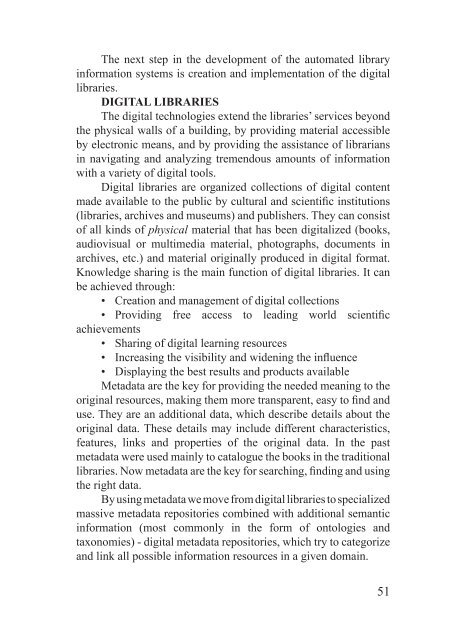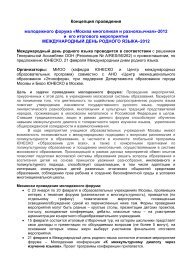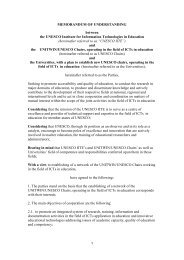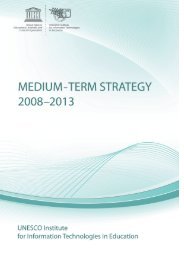ИКТ и качество образования: Ассоциированные ... - unesco iite
ИКТ и качество образования: Ассоциированные ... - unesco iite
ИКТ и качество образования: Ассоциированные ... - unesco iite
You also want an ePaper? Increase the reach of your titles
YUMPU automatically turns print PDFs into web optimized ePapers that Google loves.
The next step in the development of the automated library<br />
information systems is creation and implementation of the digital<br />
libraries.<br />
DIGITAL LIBRARIES<br />
The digital technologies extend the libraries’ services beyond<br />
the physical walls of a building, by providing material accessible<br />
by electronic means, and by providing the assistance of librarians<br />
in navigating and analyzing tremendous amounts of information<br />
with a variety of digital tools.<br />
Digital libraries are organized collections of digital content<br />
made available to the public by cultural and scientific institutions<br />
(libraries, archives and museums) and publishers. They can consist<br />
of all kinds of physical material that has been digitalized (books,<br />
audiovisual or multimedia material, photographs, documents in<br />
archives, etc.) and material originally produced in digital format.<br />
Knowledge sharing is the main function of digital libraries. It can<br />
be achieved through:<br />
• Creation and management of digital collections<br />
• Providing free access to leading world scientific<br />
achievements<br />
• Sharing of digital learning resources<br />
• Increasing the visibility and widening the influence<br />
•<br />
Displaying the best results and products available<br />
Metadata are the key for providing the needed meaning to the<br />
original resources, making them more transparent, easy to find and<br />
use. They are an additional data, which describe details about the<br />
original data. These details may include different characteristics,<br />
features, links and properties of the original data. In the past<br />
metadata were used mainly to catalogue the books in the traditional<br />
libraries. Now metadata are the key for searching, finding and using<br />
the right data.<br />
By using metadata we move from digital libraries to specialized<br />
massive metadata repositories combined with additional semantic<br />
information (most commonly in the form of ontologies and<br />
taxonomies) - digital metadata repositories, which try to categorize<br />
and link all possible information resources in a given domain.<br />
51
















